Key takeaways:
- Medical decision support systems enhance healthcare professionals’ decision-making by providing evidence-based recommendations and reducing cognitive load.
- Adaptability in healthcare is critical for ensuring patient care aligns with the latest evidence, requiring ongoing education and open communication among teams.
- Effective evidence-based practices rely on collaboration, systematic reviews, and continuous outcome assessment to improve patient care.
- Future adaptability in healthcare will be increasingly driven by technology, allowing real-time data insights and patient feedback to shape treatment protocols.
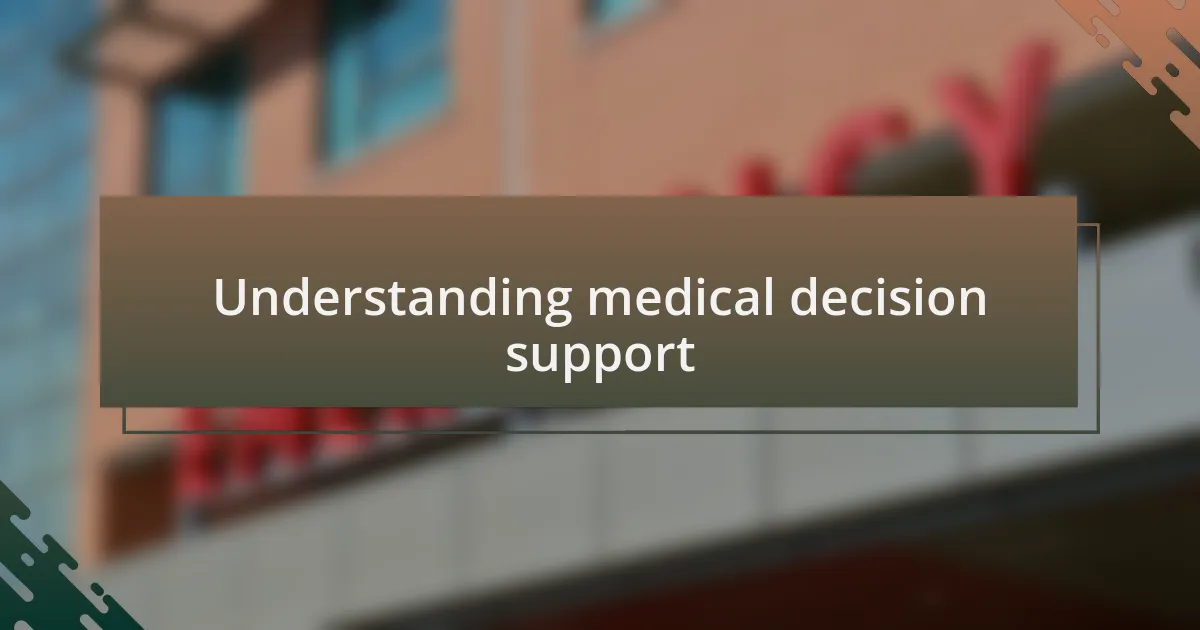
Understanding medical decision support
Medical decision support systems are designed to assist healthcare professionals in making informed decisions by providing them with evidence-based recommendations. I remember the first time I used one of these systems during a clinical rotation; it was like having a seasoned mentor at my side, guiding me through complex cases. It truly highlighted how technology could enhance our judgment and ultimately improve patient outcomes.
These systems utilize vast amounts of clinical data and algorithms to present relevant information quickly, which can feel overwhelming at times. Have you ever paused and thought about how much knowledge a doctor must juggle in their practice? Having access to reliable decision support tools not only eases this cognitive load but also instills a sense of confidence in the choices we make as practitioners.
Moreover, the adaptability of these systems is crucial. I’ve encountered instances where guidelines changed overnight due to new research findings. In these moments, it’s evident how vital it is for a medical decision support system to evolve alongside the latest evidence. It raises an interesting question: How can we ensure that these tools remain relevant in a fast-paced medical world? The answer lies in continuous improvement and integration of user feedback, paving the way for a more effective healthcare approach.
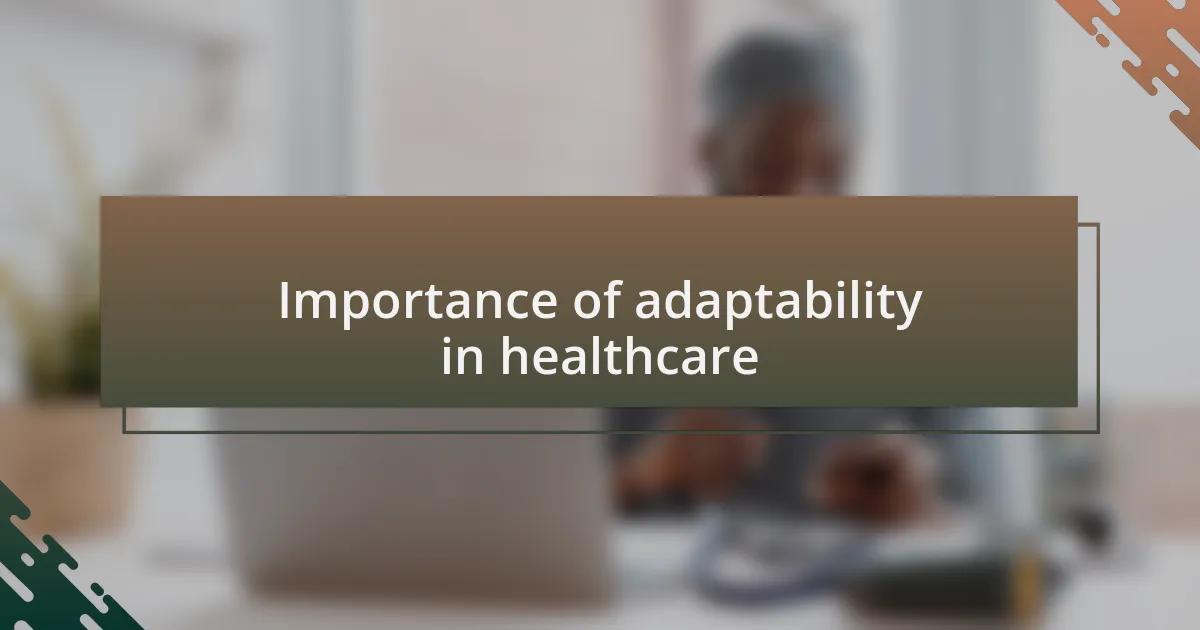
Importance of adaptability in healthcare
In healthcare, adaptability is not just a luxury; it’s a necessity. I recall a particular case where a treatment protocol I was accustomed to became obsolete almost overnight. Suddenly, we had to adjust to new guidelines that emerged from a recent clinical trial. This experience underscored for me how crucial it is for healthcare practitioners and systems to embrace change swiftly, ensuring that patient care is always anchored in the most current evidence available.
The real challenge lies in maintaining this adaptability across various medical disciplines and settings. There have been times when I’ve witnessed a significant gap in communication among team members regarding updated practices. How can we avoid these pitfalls? By fostering an environment that prioritizes ongoing education and open dialogue, we can collectively adapt to evolving standards and better serve our patients.
Ultimately, the importance of adaptability in healthcare resonates deeply with me. It’s not just about keeping pace with new information; it’s about being proactive in integrating these changes into our daily practice. When I see my colleagues embrace flexible approaches and share knowledge, it feels like we’re collaborating in a dynamic dance, all aimed at creating the best possible outcomes for our patients. Isn’t that the essence of healthcare?

Key components of evidence practices
Key components of evidence practices are foundational to delivering effective healthcare. In my experience, the integration of systematic reviews, clinical guidelines, and patient preferences creates a robust framework for decision-making. For instance, I once led a team meeting where we discussed the implications of a recent guideline change; this sparked a vigorous debate about various treatment pathways that ultimately led to a well-rounded decision that considered everyone’s insights.
Another critical component is the continuous assessment of outcomes. I recall a time when we implemented a new medication based on evidence from recent studies. Monitoring its effectiveness not only reassured our patients but also reinforced our commitment to evidence-based practice. It made me wonder: how often do we pause to evaluate the impacts of our decisions? This reflection is vital as it transforms data into meaningful improvements in patient care.
Moreover, collaboration among interdisciplinary teams plays a significant role in evidence practices. I vividly remember working alongside specialists from different fields to address a complex case. Each discipline brought unique knowledge that informed our approach and ultimately led to better patient outcomes. Through these collaborative efforts, I’ve learned that diversity in perspectives enriches our understanding, fostering a culture of adaptability that is essential for ongoing success in healthcare.
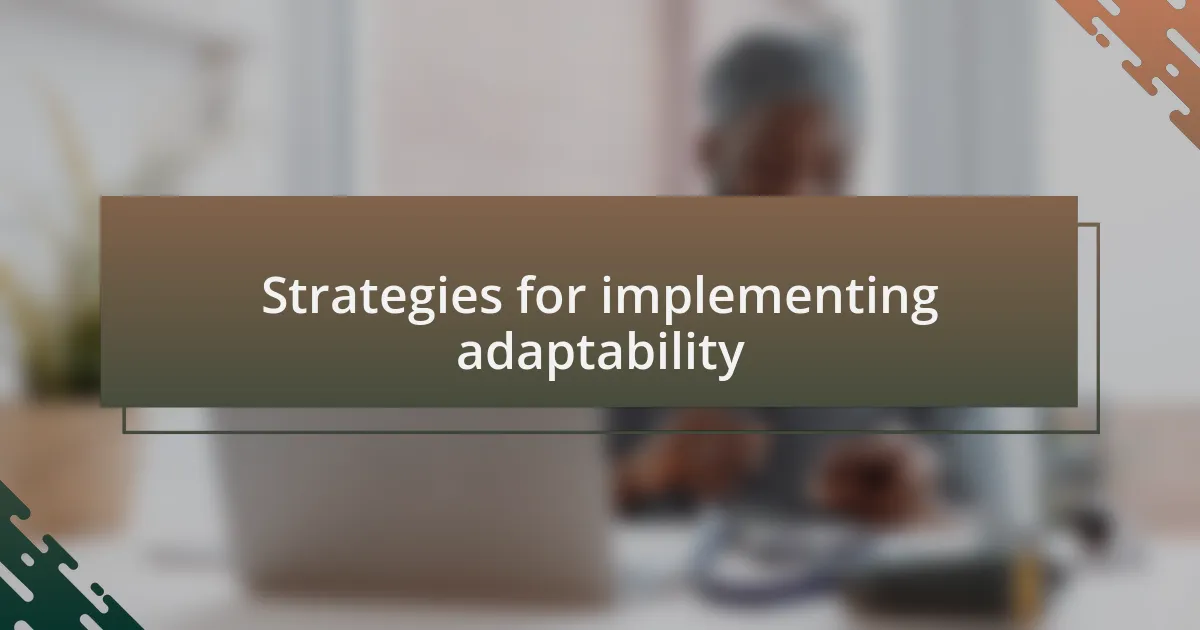
Strategies for implementing adaptability
When it comes to implementing adaptability, one effective strategy is fostering a culture of open communication. I remember a particularly poignant moment during a departmental meeting when one of our junior staff members voiced concerns about an outdated protocol. Instead of brushing it off, we collectively evaluated alternative approaches. This experience taught me that encouraging team members to share their thoughts without fear can lead to innovative improvements and a stronger, more adaptive system.
Another strategy is incorporating regular training sessions focused on the latest evidence and technology. I once attended a workshop where we practiced simulations based on new clinical guidelines. This hands-on experience not only sharpened our skills but also allowed us to visualize how adaptable we could be in real scenarios. Isn’t it fascinating how the right training can not only enhance knowledge but also transform our readiness to embrace change?
Finally, establishing feedback loops can significantly enhance adaptability in practice. I recall implementing a weekly check-in with my colleagues after we introduced a new diagnostic tool. We shared outcomes, challenges, and successes, which not only pinpointed areas for improvement but also celebrated our adaptability in navigating the shifts. Reflecting on our experiences together solidified my belief that feedback fuels progress, ultimately leading to better patient care outcomes. How do you set up feedback mechanisms in your own practice?
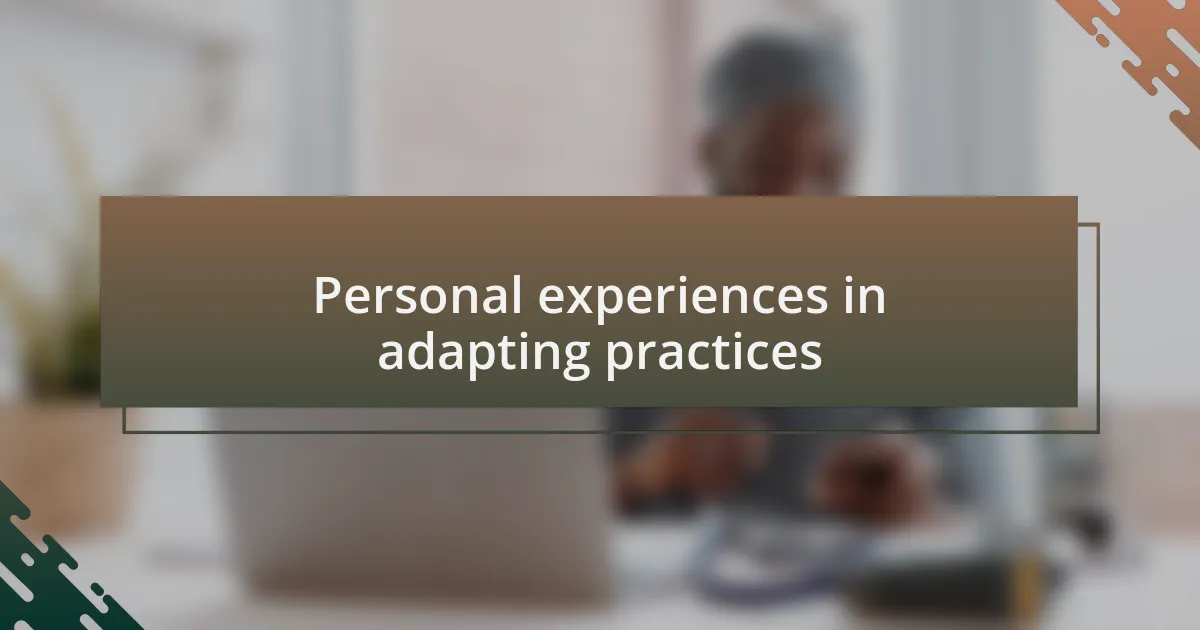
Personal experiences in adapting practices
I have had my share of moments that tested my ability to adapt in practice, particularly when I joined a new multidisciplinary team. Early on, I found myself hesitant to suggest changes to established routines. However, a colleague’s openness in sharing her own struggles encouraged me to speak out. This simple act of vulnerability fostered an environment where we collaboratively explored new ways, ultimately leading to a more efficient workflow. Isn’t it remarkable how shared experiences can empower us to step out of our comfort zones?
Reflecting on another occasion, I remember when we faced a sudden influx of patients requiring urgent care due to a flu outbreak. Our established protocols were put to the test, and I had to quickly adjust my approach. I initiated daily briefings to redefine responsibilities and prioritize tasks. The chaotic atmosphere pushed me to embrace flexibility, and I discovered a renewed sense of teamwork. How often do we underestimate the power of quick thinking and collaboration in high-pressure situations?
Another significant instance was when we had to transition to telemedicine practically overnight. I was initially overwhelmed, feeling unprepared for such a monumental shift. However, as I familiarized myself with the technology, I started to see it as an opportunity rather than a hurdle. Each virtual appointment brought with it a unique set of challenges that encouraged me to adapt my communication style. It truly made me appreciate the transformative potential of change, reminding me that adaptability isn’t just about coping; it’s about thriving in new environments. How has technology reshaped your own practice?
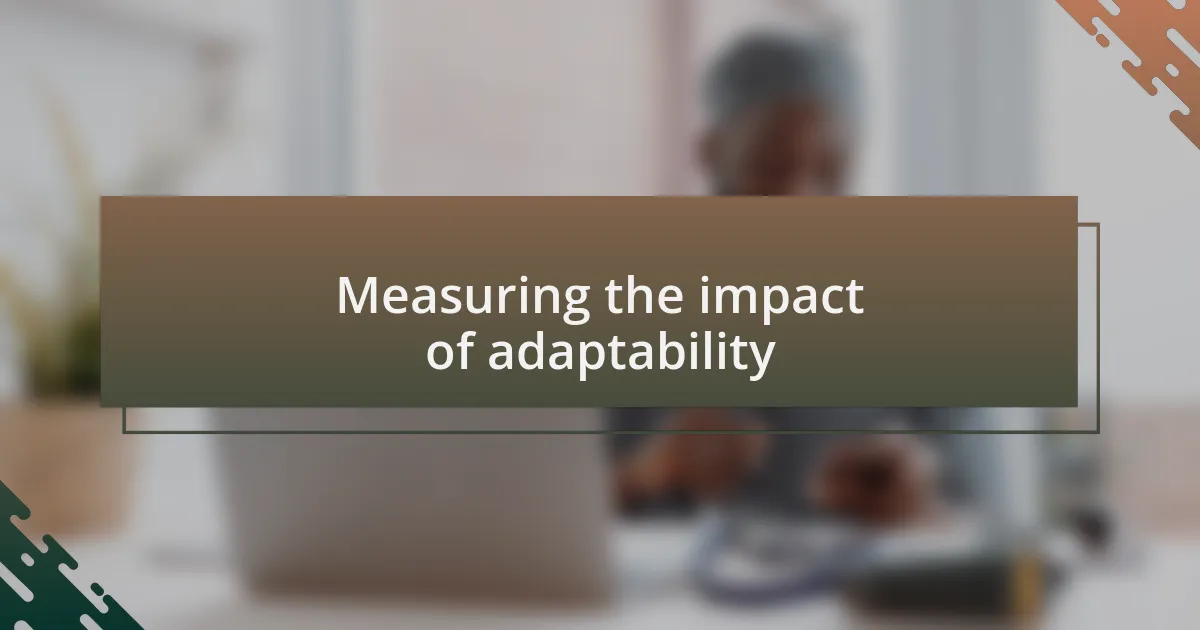
Measuring the impact of adaptability
When it comes to measuring the impact of adaptability, I often reflect on how rapid changes can alter our effectiveness in real-time. For instance, during a recent surge in telehealth usage, I tracked patient satisfaction scores before and after implementing new virtual communication strategies. Seeing a noticeable increase in positive feedback not only validated my approach but also reinforced the idea that adaptability can lead to measurable improvements in patient care. Have you ever quantified the results of your changes?
A fascinating aspect of adaptability is its ripple effect on team dynamics. I recall a time when our adaptability in handling unexpected staff shortages made a significant difference in teamwork and morale. By frequently assessing our workload and redistributing tasks, we were able to maintain high standards of care. I remember feeling a deep sense of pride as our team’s flexibility transformed what could have been a crisis into an opportunity for collaboration. How often do we overlook the importance of teamwork in measuring the outcomes of our adaptive practices?
Moreover, data collection around adaptability can provide insights that might not be immediately apparent. For instance, I’ve started using pre- and post-adaptability surveys with my team after introducing new protocols. The feedback often reveals unanticipated benefits, like increased confidence and reduced stress levels. Isn’t it interesting how simply asking the right questions can shed light on the broader impact of adaptability in our practices?

Future of adaptability in healthcare
As I consider the future of adaptability in healthcare, I can’t help but envision a landscape significantly shaped by technology and patient-centric approaches. For instance, I’ve seen firsthand how artificial intelligence can analyze vast amounts of patient data to predict outcomes, allowing us to adapt treatment plans swiftly. Isn’t it exciting to think that soon, our decisions may hinge on real-time data insights rather than static guidelines?
I recall a time when our clinic faced sudden changes in regulations. The flexibility of our team allowed us to pivot protocols in just a few days, emphasizing the value of having a culture that embraces change. I often wonder, how can we cultivate an environment that not only anticipates future challenges but thrives in the face of them?
Looking ahead, I truly believe that adaptability will foster collaborative networks between healthcare providers and patients. Imagine a system where patient feedback on treatment efficacy leads to instant protocol adjustments. This not only empowers patients but enhances their overall experience. Are we ready to embrace a future where adaptability isn’t just a skill but a fundamental principle guiding all our healthcare practices?